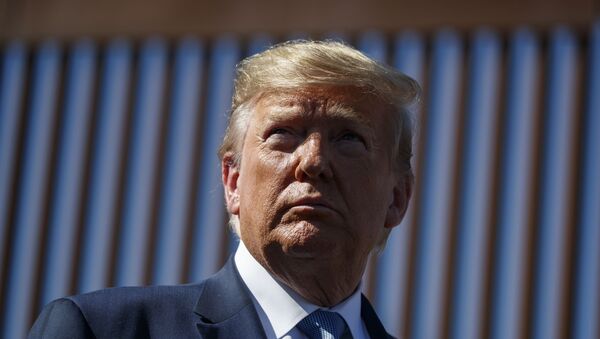US President Donald Trump has touted the construction of a “powerful” wall on the nation’s southern border, naming it after himself.
“The powerful Trump Wall is replacing porous, useless and ineffective barriers in the high-traffic areas requested by Border Patrol,” he tweeted on Saturday alongside a photo of a section of a steel-bollard-style fence.
Trump attributed the recent drop in illegal crossings into the United States to the progress in the construction of the fence he had long advocated for.
The powerful Trump Wall is replacing porous, useless and ineffective barriers in the high traffic areas requested by Border Patrol. Illegal crossing are dropping as more and more Wall is being completed! #BuildingTheWall pic.twitter.com/2kdHNSMM04
— Donald J. Trump (@realDonaldTrump) January 11, 2020
Why does Trump want to build a wall?
Trump has repeatedly described the situation on the border – which deteriorated in the fall of 2018 following the exodus of Central American migrants – as a crisis.
“Build the wall” on the border with Mexico was the rallying cry of his 2016 campaign; he said it would help the border authorities tackle illegal immigration, human trafficking, drug smuggling and other related crimes.
What has he done three years in?
Before Trump took office, there already were 654 miles (around 1,000 km) of fencing along the nearly 2,000-mile southern border. His administration wants to build an additional 450 miles by the end of 2020.
On Friday, the Department of Homeland Security announced that the first 100 miles of new fencing had been completed. Most of that fencing replaced or reinforced the majority of existing dilapidated barriers.
100+ MILES—CBP and U.S. Army Corps of Engineers have built more than 100 miles of new border wall system in the San Diego, El Centro, Yuma, Tucson, El Paso and Rio Grande Valley Border Patrol Sectors. pic.twitter.com/mHxfZjK58h
— CBP (@CBP) January 11, 2020
Has there been any challenge to his plans?
The border wall construction had been complicated by battles for funding with the Democrats, both on the floor of Congress and in courts.
The resistance by Democrats in Congress to Trump’s border wall plans led to the longest-ever government shutdown in US history at the end of 2018.
Trump re-opened the government in January 2019 but gave Congress three weeks to meet his funding demands and avert another shutdown. When lawmakers allocated just $1.4 billion for the border wall – far less than the $5.7bn he had sought – he declared a national emergency, citing an “invasion” at the border to effectively circumvent Congress and enable a $3.6-billion diversion of military funds to the project.
The Democrats challenged that decision in courts, but a federal appeals court on Wednesday handed Trump a big victory by allowing him to use those funds.
Congress separately allocated another $1.4 billion for new border barriers in December 2019, and the Supreme Court allowed the administration to use another $2.5 billion from military funds in July 2019. This gives Trump some leeway to press ahead with the construction, which is set to accelerate as the next presidential election approaches.
Meanwhile, arrests at the southern border fell for a seventh consecutive month in December, immigration officials announced last week. That number made up just under 33,000 last month, a 70-percent drop from the peak of 130,000 in May 2019.
In 2017, Trump’s first year in office, there were 300,000 migrant detentions at the Mexico border – the lowest number since 1971. It grew to 400,000 in 2018 and surpassed 800,000 in 2019.


